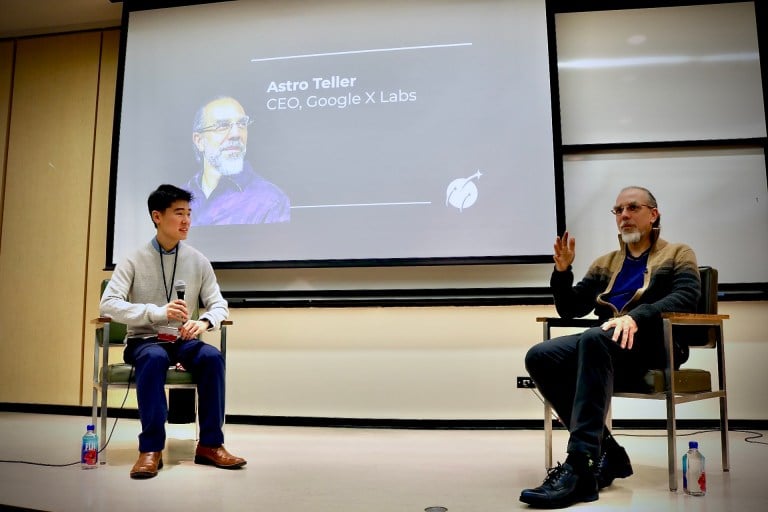CEO of Google X Labs and Stanford alum Eric “Astro” Teller ’93 encouraged students to search for science fiction-sounding solutions to world problems and craft their “moonshot story” during a Q&A event hosted by the Stanford Moonshot Club on Jan. 19.
Teller is an American entrepreneur, inventor and author. He is the CEO and founder of Alphabet’s X, formerly known as Google X, a research and development company that focuses on developing new technologies such as Google Glass, Project Loon and Waymo. Teller also co-founded Cerebellum Capital, a hedge fund that uses machine learning to inform its investment strategies.
The event, attended by students and faculty, was moderated by Moonshot officers Jason Lin ’25, Kaien Yang ’25 and Nicole Segaran ’25. The talk was divided into three sections, including a query created by ChatGPT.
In section one, “Astro’s Experience,” Teller touched on the qualities of a “moonshot” project. According to Teller, a successful “just shy of bonkers” proposal is divided into three steps: first, define a problem; second, propose a radical solution, some kind of science fiction-sounding product; third, test the product, and as long as you learn something during the process, consider the learning journey a success.
“What is the radical proposed solution for fixing some kind of problem with a science fiction-sounding product or service? If the product sounds reasonable, X should not be doing it. That wouldn’t count as a moonshot idea because other companies would be better set up to solve it,” he said.
Teller reflected on his experiences at Stanford and many companies, which he said shaped his perspective and approach to innovation and research. He cited the influence of Stanford computer science professor Nick Parlante, who teaches Stanford’s popular introductory programming class CS106A, causing the audience to laugh and clap.
Teller also offered advice based on his experiences as CEO, acknowledging the changes he made to his leadership style over the years.
“I thought that being smart defined me and my view of the world, and that’s where I was when I was 20. I decided to let go of tying my sense of self-worth to being smart because I wanted to be a good CEO,” he said.
In section two, “Personal Philosophy,” Teller offered advice for students in the audience who hope to create similar projects, jokingly noting that he entered his first interview with the intention of running the company in the future.
“Definitely go in super open to learning stuff. But be respectfully skeptical enough that you can learn fast, because if you’re too close, right, you won’t learn anything. But if you’re too deferential, if you’re not poking at things, then you won’t learn quickly either,” he said.
Teller’s personal philosophy is to first “work on the hardest part of the problem,” which allows him to determine whether a project is worth pursuing. He proposed a hypothetical to the audience: getting a monkey to stand atop a pedestal and recite Shakespeare.
“What should we do first? For most companies, there’s a temptation to build the pedestal first. Because it feels good; you got something done. But you’re not even halfway there,” he said. “You train the monkey: find out what is most likely to kill a project and go figure out that part first.”
In the last section, “Visions for the future,” Teller said the main areas of innovation that will grow in the future, changing the ways in which we live and work, are chatGPT, elevation models and synthetic biology. He said the biggest global issues include education and climate change. Collective action in improving education should be viewed as the ultimate goal, he said.
“Democracy is teetering on the edge in this country and lots of countries around the world, and having a more civically-minded populace isn’t going to happen without better education,” he said. “I don’t think it’s technologies that can solve that problem.”
